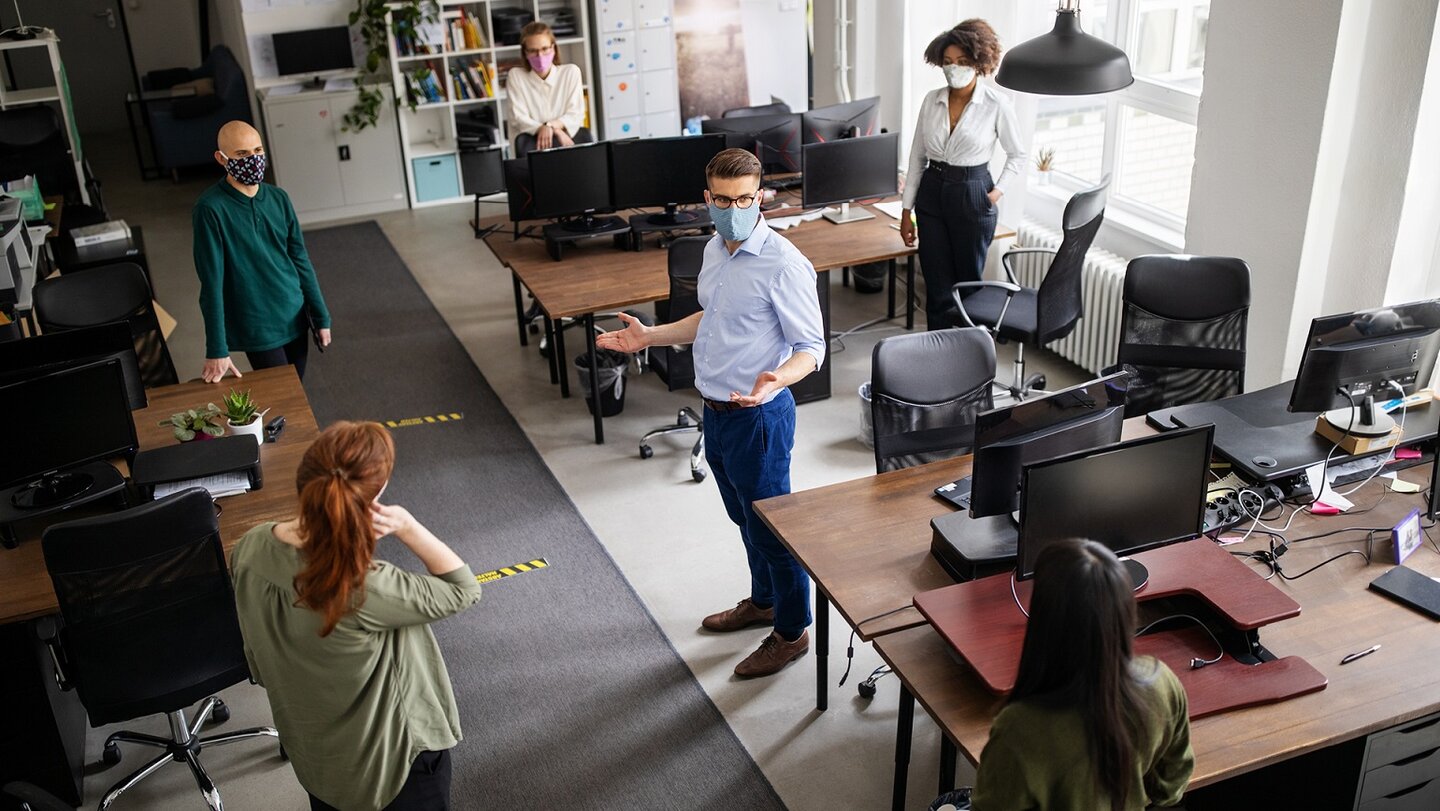Having previously been the head of the Institute for Emergency Medicine and Medicine Management at the University of Munich Medical Centre, it’s safe to say that Prof. Christian Lackner, Director of the Healthcare Division at Drees & Sommer, knows his stuff when it comes to hygiene. Here, we talk to him about hygiene at work, best practices for employees and the future of work.
The interview was conducted by Harald Czycholl-Hoch, freelance business journalist
The coronavirus pandemic has changed the world in one fell swoop with millions of employees suddenly starting to work from home. Which means that comprehensive hygiene measures will need to be in place if they return to their offices. For example, social distancing measures and clear signposting systems are needed and office spaces need to be easy to clean. More automatic things, such as automatic doors, may also be necessary. At the same time, employees will have to change their behaviour in order to minimize the risk of outbreaks of the disease. In this interview, Prof. Christian Lackner, director of the healthcare division at Drees & Sommer, discusses health and well-being in the workplace – and predicts that some hospital hygiene practices may soon be adopted.
Professor Lackner, what lasting legacy do you think the coronavirus will have on the office?
Prof. Lackner: "It’s something that has been largely ignored in the past, perhaps out of some mistaken sense of loyalty to employers. And it’s: never come to work when you’re sick! If you have any kind of flu-like symptoms such as a fever, cough, a headache or pain in your limbs, make sure that you stay at home to ensure that your symptoms do not worsen and that you’re not exposing your colleagues to the risk of infection. Even if you’ve only got mild symptoms, it’s still important to work from home because when you’re busy on your typical office workday, it’s almost impossible to ensure that you won’t infect your colleagues."
What challenges do employers face with the imminent return of workers?
"In the initial phase, there will need to be fundamental changes to ensure the safety of workers and mitigate anxiety. Although we have plenty of experience dealing with influenza viruses – like the common flu – this is the first time that our generation has lived through a pandemic. We are all highly aware of the health risks, whether real or imaginary, and employers are particularly wary about the potential for liability if people get sick at work."
What do we need to do in the short term so that companies can get back to something approaching normality in the office?
"The key thing is to make hygiene systemic. On the one hand, there should be a code of conduct in place for employees, with guidelines for things like hand sanitation, an etiquette for coughing and sneezing, social distancing and wearing personal protective equipment. On the other hand, we need to be aware of the ways that the infection can spread at work, at home and in the community, so that the risk can be minimized. So, we need to offer basic webinar classes or brochures to employees that provide the relevant information in their preferred language. Next, to help enforce social distancing rules, it might be a good idea to use the stairs instead of lifts and to use floor markings. There shouldn’t be any food in communal kitchens, which should be exclusively for making drinks like coffee or tea. Any cutlery should be put straight into the dishwasher after use. Finally, discussions need to be had with the cleaning company about how to safeguard hygiene over the long term. In an acute outbreak, cleaning has to be much more frequent and may have to take place during regular office hours. Depending on the type of virus, the busiest areas may have to be cleaned several times a day."

Will we need to wear masks in the office in the future?
"In areas where the minimum social distancing requirements can’t be ensured with barriers, markings and access restrictions, it is necessary – and entirely reasonable – to ask all employees to wear masks. Since the upper nose is a key area where the virus replicates itself, it’s essential to remember to cover the nose as well as the mouth. This may be a little uncomfortable if you’re new to wearing a mask, and some masks are more comfortable than others, but you should get used to it pretty soon."
What organizational measures can employers take in order to ensure office hygiene?
"Firstly, employers can make disinfectants available and put up reminders for people to clean their hands regularly. Next, if possible, they should minimize opportunities for contact in the offices; e. g. shift changes, breaks, meetings. In desksharing arrangements, surfaces should be cleaned regularly and thoroughly. Ensure that door handles, keyboards, mouses and headsets are also cleaned frequently. The tables and seating in social spaces like canteens should be reconfigured to have a minimum of 1.5 metres of distance between people."
What about all the conferences and meetings that we typically have in a normal workday?
"If possible, employees should be encouraged to use virtual conferencing tools instead of meeting in person. If the meeting has to be done in person, it should be limited to a maximum of 10 people and consideration should, of course, be given to the size of the room, and whether the seating and signage allow an appropriate level of social distancing. Since viruses tend to accumulate rather like an aerosol, it’s important that the room is well ventilated as well as being regularly disinfected – ideally rooms should be ventilated for at least 15 minutes before being used, especially when other people were previously using it. Whilst the meeting is happening, a window should be opened every 15 to 20 minutes for at least five minutes. It would be even better to have the windows open throughout the meeting if the need for confidentiality doesn’t preclude it."
“A pandemic-ready office will adopt short-term organizational changes, medium-term working patterns and a long-term design rethink that puts hygiene at the centre of building planning and office infrastructure.”
What do we need to do from a construction viewpoint to meet these new requirements?
"A pandemic-ready office will adopt short-term organizational changes, medium-term working patterns and a long-term design rethink that puts hygiene at the centre of building planning and office infrastructure. In the short term, permanent disinfectant dispensers and partitions are needed – not just the plexiglass ones at the reception. We’ll see the return of cubicles. In the past, they were employed for privacy and because the acoustics were better, but now they will help create a physical separation between employees. Until we have a vaccine, people will feel more comfortable with a physical barrier. Unsurprisingly, there is a trend where many companies have announced an end to the open-plan office and a return to small, private offices. Potentially spaces like “huddle rooms”, which are small meeting rooms for up to six people, could also be used as offices until social distancing rules are relaxed. In addition, the seating areas at reception should be removed to get rid of any possibility of people coming into close proximity."
How will future office buildings be designed to meet these sorts of hygiene requirements?
"Because of society’s heightened awareness about infectious diseases, experts predict that in the long term, the office may share certain characteristics with hospitals. One important takeaway is to choose materials that are robust enough to be cleaned with corrosive cleaning products. That would mean avoiding porous surfaces like woods with natural oils and going for stone or laminate instead. I would also expect there to be carpets with moisture-resistant bases and colours that can deal with powerful shampoo treatments. These durable materials aren’t necessarily more expensive than the better-known alternatives either, which is important in tough economic times when few companies have the budget for expensive refits. If there’s little difference in terms of costs, it’s more a question of deciding which of the options works best. Another feature of hospitals that may be adopted in the office is wash basins at reception and in public areas."
Will office life ever return to how it was before the coronavirus pandemic?
"Probably not, because we need to be more prepared for future pandemics and certain hygiene measures that were put in place because of COVID-19 are a good idea anyway. In the medium term, we need to design a completely new type of office. Some innovative companies are already interested in the idea of distributed offices. In this model, instead of having a crowded central hub, groups of staff are based out of smaller offices that could potentially be closer to home for those employees. This could also help to reduce traffic and reduce the risk of infectious diseases spreading on public transport. By working together in smaller groups, we can satisfy our need for connection and maintain positive mental health without the risk of everyone in the company needing to self-isolate if someone gets the virus. In order to avoid rush hours on transport, staggered working times could become the norm, with smaller groups of colleagues coming to the office on alternating days, or in alternating shifts."
Prof. Dr. med. Christian Lackner, Director Healthcare Division at Drees & Sommer
Prof. Christian K. Lackner is a clinician working in a real estate company. Christian switched from his role as Director at the Institute for Emergency Medicine and Healthcare Management at the University of Munich Medical Centre, which he held for many years, to become the Senior Consultant at the Healthcare Division of the Stuttgart-based real estate consultancy, Drees & Sommer. He has consulted large clinics for many years on alarm and contingency plans for coping with mass-casualty incidents (MCI) and mass-infection incidents. He also helps these institutions roll out and standardize these plans at a regional and national level.

The corona pandemic has suddenly brought us face to face with issues – such as digitization and sustainability – that the construction sector would have had to address sooner or later anyway. Whilst it's clear that the office itself is still relevant, what will it actually look like?
What will characterize the offices of the future, which aspects will be important for the workplace in the future and for everyone connected with it, is the subject of numerous articles and interviews in our dossier "The Workplace Reloaded".